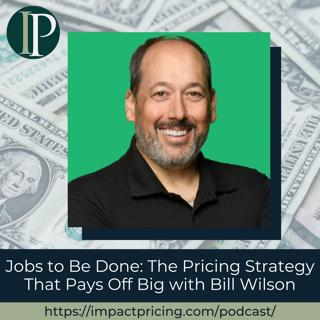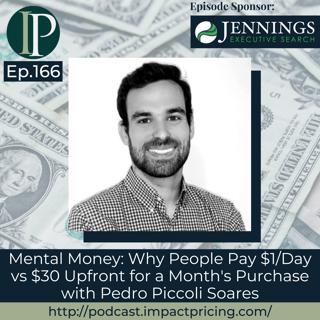
Mental Money: Why People Pay $1/Day vs $30 Upfront for a Month's Purchase with Pedro Piccoli Soares
Pedro Piccoli Soares is currently Senior Executive Manager of AI Pricing at SIXT, a travel arrangement / car rental company that's known to be a provider of high-quality mobility services. He mentors startups, and has an Engineering degree. He also has a purple belt in Brazilian jiu-jitsu. In this episode, Pedro shares his knowledge when it comes to behavioral economics as he and Mark talk about how it works in relation to mental accounting and pricing. Why you have to check out today's podcast: Discover why it's important for companies to understand why they're doing pricing and why they're having a price change Understand why you should still be relative to your competitors' price change even when they've already made the mistake of decreasing their prices Learn more about behavioral economics, its tactics, and its relationship with mental accounting and pricing "So, we've mentioned several different effects of behavioral economics and several different examples of how they can be applied on real business. If you think about it, they were quite simple, right? It's really easy to test these kinds of things, and they can generate some really nice benefits to your company, for sure." – Pedro Piccoli Soares Topics Covered: 01:40 – The internship that led to Pedro's shift from being an Engineer to doing pricing 03:09 – What Pedro loves about pricing that made him stay in it 05:34 – Why it's important for companies to understand why they're doing pricing and why they're having a price change 07:38 – Being relative to competitors' price change even when they made the wrong decision 10:20 – Talking about behavioral economics; what Mark doesn't like about it 12:33 – Behavioral economics' tricks: Pedro and Mark's perspectives in relation to price endings in relation to mental accounting 18:49 – Discussion about what loss aversion is 20:38 – The use and importance of loss aversion, especially in business 23:23 – Behavioral economics and people's buying decisions in relation to good, better, best 25:53 – Pedro's piece of pricing advice for today's listeners Key Takeaways: "This is when you kind of lose the sense of why you're doing the price change. If you just follow your competition, if you don't know the reason why you're changing the prices, you can initiate a fight that in the end has no background or no reason to be happening. You are assuming that everything that they are doing is right, and that they know why they are changing prices. It might be the case, but might be the case that they are also doing something wrong and you're just following them. You need to understand your customers and what price changes will affect them. You need to have a reasoning you apply when you're changing the price." – Pedro Piccoli Soares "I totally agree that behavioral economics cannot generate as much value as pricing departments can generate. And it's, on the other hand, a much nicer topic to talk about to show results. You can definitely play around and create experiments, and you can very easily show the results of a try, and it's something that calls people attention because it's actually behavior, and that's something that they do as well, right? So, everybody wants to listen and to hear about heuristics, or the mistakes, the biases that they take when they're making decisions. And that's why I think it's a topic that costs more attention than pricing." – Pedro Piccoli Soares "When you have two different people, we have so many different characteristics that it's harder to compare. And if you have just two similar options, one, which is clearly worse than the other, you make the choice easier." – Pedro Piccoli Soares People / Resources Mentioned: SIXT: https://www.sixt.com/ Dan Ariely: https://danariely.com/ Connect with Pedro Piccoli Soares: LinkedIn: https://www.linkedin.com/in/pedro-piccoli-soares/ Email: piccolisoares@gmail.com Connect with Mark Stiving: LinkedIn: https://www.linkedin.com/in/stiving/ Email: mark@impactpricing.com
28 Maalis 202228min

Blogcast #47: Another Netflix Increase
This is an Impact Pricing Blog published on February 16, 2022, turned into an audio podcast so you can listen on the go. Read Full Article Here: https://impactpricing.com/blog/another-netflix-price-increase/ If you have any feedback, definitely send it. You can reach us at mark@impactpricing.com. Now, go make an impact. Connect with Mark Stiving: Email: mark@impactpricing.com LinkedIn: https://www.linkedin.com/in/stiving/
25 Maalis 20223min
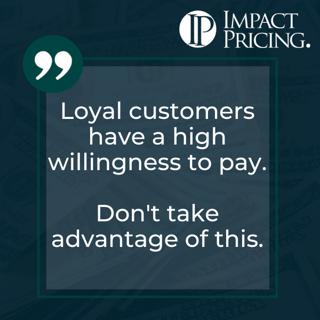
Memecast #50: Loyal Customers
The whole point of pricing, value-based pricing, is to charge what customers are willing to pay. And almost by definition, loyal customers like us more, they would be willing to pay us more. This is the big exception to the rule of charge what a customer is willing to pay. My intent when I do price segmentation and charge different customers different prices is I also want to think about the lifetime value of a customer. If you have a customer who loves you, they're very loyal to you, and yet they find out that you are charging them more than anybody else, it will upset them. You have a really high probability of losing them as a customer. And if you do, you lost the lifetime stream of value. So, my advice, treat loyal customers really, really well, and don't charge them more than other people. We hope you enjoyed this memecast. If you have any questions or feedback, please email me mark@impactpricing.com. Now, go make an impact. Connect with Mark Stiving: Email: mark@impactpricing.com LinkedIn: https://www.linkedin.com/in/stiving/
23 Maalis 20221min
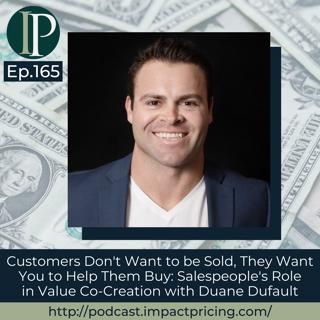
Customers Don't Want to be Sold, They Want You to Help Them Buy: Salespeople's Role in Value Co-Creation with Duane Dufault
Duane Dufault is currently a Fractional CRO at Forward and is a Strategic Advisor at Abaqus Inc. Before this, he was Fractional VP of Sales at The RockED Company Inc. Duane is a dad of four lovely daughters. In this episode, Duane shares the power behind having all departments in a company understand value in order to help the customer see and understand value as well in accordance with their reasons for buying a product. Why you have to check out today's podcast: Discover why it's important for you to teach your sales reps to unpack value and not create it Find out why it's a must for you to help people understand what it is that they're actually paying for upon purchasing your product Understand the reason behind having clients voice out their problem and a salesperson being able to connect the product as a solution to what a client needs to be solved "Just make it easy, seriously. The easier you can make it for people to figure out the pricing on your product, the easier it is for them to buy. Simple." – Duane Dufault Topics Covered: 01:15 – The connection between Duane's role and pricing 02:14 – That time when Duane realized the immense need for product management to focus on pricing 05:26 – Talking about the similarities and differences of product marketing and sales roles 09:50 – Should salespeople have the authority when it comes to pricing? 14:36 – Why salespeople need to unpack value, not create it 17:12 – Reminiscing Mark's first few years as a salesperson 18:42 – Making a difference in the market in relation to value and what the customer's needs are 23:08 – The difference between a CRO and a VP of Sales in Duane's perspective 25:27 – Duane's piece of pricing advice for today's listeners Key Takeaways: "One of the growth levers that I was looking at is like how was pricing structured for whatever product it is because that's a really big indicator on how people are going to buy from your company. If you've got hard to understand pricing, that's a problem. And that's friction in the buying process that you need to remove." – Duane Dufault "Product marketing and a good sales process are like two sides of the same point. It's like sales and marketing, but like, a good sales process and product marketing is so closely tied, because the questions that a good product marketer asks are a lot of the same ones you get from a sales conversation, a discovery process, and they take them down the same path. "Product marketing is fascinating from my perspective because you need to have a certain perspective on customer engagement and usage to understand how to shape and evolve both the product, the customer journey, and what they pay for the product." – Duane Dufault "If you've got a sales rep that's very, very focused and narrow-minded on one specific area, they can't pull from other experiences." – Duane Dufault "Teach your reps how to unpack value, not add value." – Duane Dufault "If you come into your discovery process with a deck that just has a whole bunch of bullets of stuff that came from the marketing page, that's not a value to them. They only find it valuable when they find it valuable, and it's only valuable when it solves a problem. And you can't solve a problem until you ask him what those problems are." – Duane Dufault "If you have a good discovery process that's focused on the needs of the buyer, you're going to help them figure out what those differences are, because people buy on an emotional trigger, and then cancellation happens when they find those little things that don't meet up with what they really want to do. In the sales process and marketing, marketing is there to take feedback from products, to then communicate what everyone gets from it, so that way, when the prospect gets the salesperson, it's the salespersons job to unpack those little things, because those little things are going to be the reason why they don't cancel in a year." – Duane Dufault People / Resources Mentioned: Metric Manager Playbook:https://themetricmanager.com Connect with Duane Dufault: LinkedIn:https://www.linkedin.com/in/duanedufault/ Email: duane@sellingsaas.io Connect with Mark Stiving: LinkedIn: https://www.linkedin.com/in/stiving/ Email: mark@impactpricing.com Website:https://www.duanedufault.com/
21 Maalis 202227min

Blogcast #46: You Must Lose on Price
This is an Impact Pricing Blog published on February 9, 2022, turned into an audio podcast so you can listen on the go. Read Full Article Here: https://impactpricing.com/blog/you-must-lose-on-price/ If you have any feedback, definitely send it. You can reach us at mark@impactpricing.com. Now, go make an impact Connect with Mark Stiving: Email: mark@impactpricing.com LinkedIn: https://www.linkedin.com/in/stiving/
18 Maalis 20222min
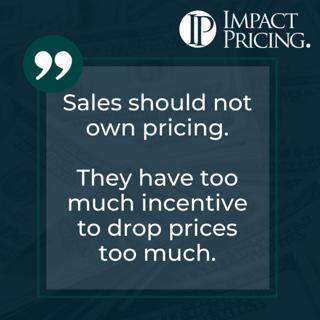
Memecast #49: Sales Should Not Own Pricing
Salespeople love them to death, however, it's more important to them to close the deal than to close it at the highest possible price. In fact, if they stay and negotiate a little bit harder, they're at risk of losing the deal. And if they lose the deal, they lose their commission. They lose the ability to reach their quotas. So, for them, their incentives are a little bit askew from what our incentives should be. And when I say our, let's say the company, the owners of the company, or us as pricing people, where we want to try to win deals at the highest possible price. So, although salespeople are really selling value and they're doing their best, in the end, price is just one of the many tools they have to try to close a deal and they're going to use every tool they have. So, I don't think salespeople should own pricing. Sure, we should give them a little bit of flexibility, a little bit of price authority to help them move deals along quicker, but to give them complete authority, probably a big mistake. We hope you enjoyed this memecast. If you have any questions or feedback, please email me mark@impactpricing.com. Now, go make an impact. Connect with Mark Stiving: Email: mark@impactpricing.com LinkedIn: https://www.linkedin.com/in/stiving/
16 Maalis 20221min
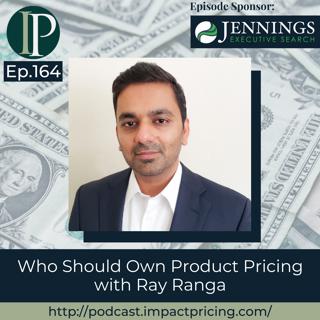
Who Should Own Product Pricing with Ray Ranga
Ray Ranga is currently the VP of Product Management at Momentive AI. Before working in Momentive, Ray was the Senior Director of Product Management at Splunk. Ray is an instructor at UC Berkeley and he also conducts a pricing class at Stanford. In this episode, Ray discusses the power behind involving the people who know the product's value when making pricing decisions as he specifically points out the benefits of having pricing teams connect with people from the product management department. Why you have to check out today's podcast: Discover which team should own pricing in a company in relation to the value the product has; Find out how to effectively package products in a way that resonates best with what your customers want; and Understand why pricing and product management people should be one when making pricing decisions towards their product "Understand your customers to a deep, deep level. See what gets your customer ticking, and then I'm sure everything else follows." – Ray Ranga Topics Covered: 01:31 – How Ray got into pricing: From being an engineer then shifting to product management 02:31 – Answering the question "who should own pricing?" 04:50 – The role of product management 05:37 – What Ray teaches in his pricing and product management/marketing class 07:43 – The difference between behavioral economics and pricing for value 10:17 – How to package products, explained in the simplest possible manner 15:44 – Why you should go for market segments first, not across market segments 18:13 – The similarities of Mark and Ray's practices when figuring out market segments 21:42 – Talking about the presence of confidence problem with regards to charging a high price 25:01 – Ray's piece of pricing advice for today's listeners Key Takeaways: "Pricing and product management need to go hand in hand." – Ray Ranga "Product marketing is good on pricing. They understand our customers well. They understand the persona and the segment we sell into typically. I do have a bias towards who should not own pricing. I feel like finance or sales should not own pricing, for some obvious reasons. But other than that, I think product management and product marketing are fine owning pricing." – Ray Ranga "Pricing is a number at the end of it, but it's so much more. It's so much more about operationalizing pricing, and that's where customer experience comes into play. You need the right ways to consume the price of the product that you just priced." – Ray Ranga "Analysis and research and competitive positioning is very useful. And I think, sometimes, you should take that seriously when you have the data points in front of you." – Ray Ranga "Enablement is very key to pricing, especially in zero to one products. You want to be with the sales team in those initial calls until they feel comfortable that they can tackle these questions about pricing in the early days." – Ray Ranga People / Resources Mentioned: Momentive AI:https://www.momentive.ai Splunk:https://www.splunk.com/ SurveyMonkey:https://www.surveymonkey.com/mp/enterprise/?ut_source2=en Predictably Irrational:https://danariely.com/books/predictably-irrational/ LinkedIn:https://www.linkedin.com/ Connect with Ray Ranga: LinkedIn:https://www.linkedin.com/in/rayranga/ Email: emailranga@gmail.com Connect with Mark Stiving: LinkedIn: https://www.linkedin.com/in/stiving/ Email: mark@impactpricing.com
14 Maalis 202228min

Blogcast #45: Losing on Price
This is an Impact Pricing Blog published on February 2, 2022, turned into an audio podcast so you can listen on the go. Read Full Article Here: https://impactpricing.com/blog/losing-on-price-2/ If you have any feedback, definitely send it. You can reach us at mark@impactpricing.com. Now, go make an impact. Connect with Mark Stiving: Email: mark@impactpricing.com LinkedIn: https://www.linkedin.com/in/stiving/
11 Maalis 20222min
